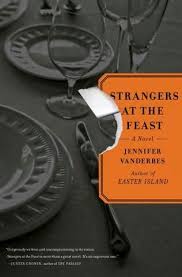
I was intrigued to read this novel long before I started reexamining her as the woman who engaged in a online battle with Jennifer Weiner. Weiner called her the pretty lady or something like that.
Vanderbees is a “literary” writer. And I won’t argue with that assessment. Her second novel is certainly an accomplishment. And it is literary in the sense that I know my mother wouldn’t like it. She likes happy endings.
Strangers at the Feast is about one suburban family gathering for Thanksgiving. Ginny, the professor daughter who recently returned from a trip to India with an adopted seven year old has decided she wants to cook Thanksgiving for her parents and her brother and his family. The cast of characters in this novel are fascinating, real and maddening. Ginny is a thirty-something woman who has found a fault with everyone she has dated, and seems at times to be playing at life. Her brother Dennis longs for his father’s approval and can barely support his family now that his job in real estate is not bringing in money. His wife Denise, who was the first member in her family to go to college seems somewhat cliché. She is from Pittsburgh. Her brothers and father worked in Steel Mills. She got herself out through sheer hard work and fortitude. She falls in love with Dennis’ optimism. Now that the family is in a precarious financial situation she finds herself working as a nutritionist in a public school in Connecticut (this is another detail that bothered me some as I have worked in a variety of public schools, none of which had a nutritionist on staff but I suppose it isn’t that large a jump). The patriarch of the family, Gavin, is a Vietnam vet who was the only Yale grad who wanted to go to Vietnam. His father was a WWII hero and he wanted to be a hero too. Before leaving he meets Eleanor at the beach. Encouraged to get marry before he goes to war, they do. Gavin comes back from the war disenchanted but also wanting more. He finds himself with few career options and winds up being a insurance salesman.
It was fascinating to read about someone who choose to serve in Vietnam, finding himself in a situation in which he exerted so little agency. He hated insurance, wanted to go to law school, but oh no, he finds out his wife is pregnant, therefore he has no options. He seemed so resigned to living a life he did not choose. I suppose that is realistic but it also bothered me immensely. When we first meet Gavin through Eleanor’s eyes, he is a man who recites poetry to her and plays the guitar. He is young and idealistic. He has heros. He looks up to his father. I understand that Vietnam shifted individuals trajectories, but it’s hard to make sense of Gavin's reaction. He doesn’t return affected by killing people. He doesn’t have PSTD. He does come back pining for a woman he left behind. He does come back to realize his wife is completely different than who he imagined. He comes back and first lives in New York City, only to be convinced by his wife that they must move to the suburbs. His is so incredibly resigned and it was heartbreaking to read. He bangs on the windows of the train, wanting to fight against his commute. He star gazes, he runs early morning miles and even marathons. But he exerts so little effort – even in parenting his own children. In the end, potentially he takes agency but it felt a little too late for me personally.
The most perplexing character is Eleanor. In the opening chapter Eleanor says something to the effect of: “those who knew our family were very surprised by what happened to us. But you all were so nice.” Eleanor highlights that she raised her children to be polite and kind to others, as if offering up something to stand in contrast to her behavior. As if explaining. As I finished the last page of this novel I turned back to the beginning. The beginning took on new meaning.
I love novels about dysfunctional families. I love reading books that ground themselves in historical events. And I was incredibly excited to read this book as it discussed eminent domain and the SCOTUS takings jurisprudence. And yet, in the end, I was upset by this novel. I walked away disturbed, not sure how to make sense of what occurred. I think Vanderbees is a deft writer and I think she portrayed this upper middle class family as well as the low-income members of Bridgeport fairly realistically. I can tell she took heed from the Elijah Anderson’s Code of the Street (which I read in college and again more recently). She took major risks as a writer. I believe the voices she created. I bought into the story until I got to the last few chapters. (Then of course everything falls together in such a cataclysmic way and to be honest I just didn’t understand why all of that was necessary).
I am incredibly interested in hearing others thoughts of this beguiling novel. What did you think?